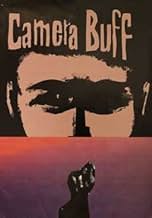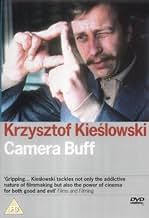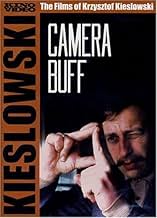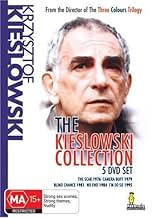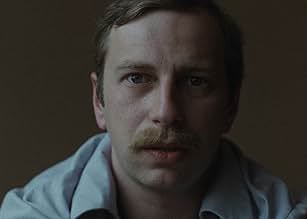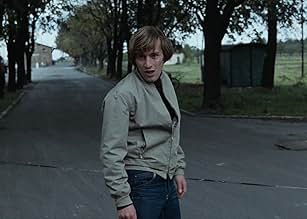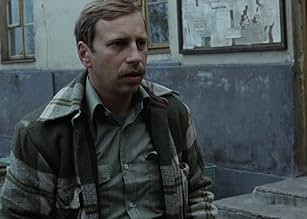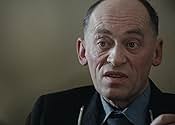CALIFICACIÓN DE IMDb
7.8/10
8.8 k
TU CALIFICACIÓN
Filip compra una cámara cuando nace su primer hijo. Como es el primero en la localidad en tener camara, es nombrado fotógrafo oficial.Filip compra una cámara cuando nace su primer hijo. Como es el primero en la localidad en tener camara, es nombrado fotógrafo oficial.Filip compra una cámara cuando nace su primer hijo. Como es el primero en la localidad en tener camara, es nombrado fotógrafo oficial.
- Dirección
- Guionistas
- Elenco
- Premios
- 6 premios ganados en total
Opiniones destacadas
Haven't seen every Kieslowski work yet (though as of now it's close), but of what has been seen all ranges between very good (the 8th episode of 'Dekalog') to masterpiece ('Three Colors: Red' and 'Blue' and the whole 'Dekalog' series). To me, he was an immensely gifted director, who died far too early.
An early effort, 'Camera Buff' is not among Kieslowski's best work, but generally it is deserving of more love. Although Kieslowski's directing style is fairly well established, remarkable for so early on, it did become more refined later on as seen with his late 80s-early 90s work. There is a preference for the more intricate-sounding music scores of his later work, this score was the kind that worked well within the film but one doesn't have the desire to hear it on its own repeatedly, and the slightly more emotional resonant and intense work like the best of the 'Dekalog' series, 'The Double Life of Veronique' and 'Three Colors: Red' and 'Blue'.
Despite how that sounds, there's actually not much wrong at all with 'Camera Buff', just that it was done better later. This said, 'Camera Buff' is a great film, regardless of what stage it was made in Kieslowski's career.
'Camera Buff', as was always the case in Kieslowski's work, is very well made. The cinematography is minimalist, but visually striking and atmospheric as well as fascinatingly personal. As well as being beautifully shot with atmospheric use of colour to match the mood, it is gritty yet beautiful with many thoughtful and emotionally powerful images lingering long into the memory. Kieslowski's direction is quietly unobtrusive, intelligently paced and never too heavy.
It's a thought-provoking film in writing, as ever thematically rich and with complex characters, the shift from initial comedy to drama expertly done rather than abrupt and jarring. Kieslowski again proves himself as a master of narrative construction, and the whole film is thoroughly engaging and suitably challenging. The acting is as always from Kieslowski marvellously nuanced and natural.
To conclude, early Kieslowski that while not one of his best is deserving of more love. 9/10 Bethany Cox
An early effort, 'Camera Buff' is not among Kieslowski's best work, but generally it is deserving of more love. Although Kieslowski's directing style is fairly well established, remarkable for so early on, it did become more refined later on as seen with his late 80s-early 90s work. There is a preference for the more intricate-sounding music scores of his later work, this score was the kind that worked well within the film but one doesn't have the desire to hear it on its own repeatedly, and the slightly more emotional resonant and intense work like the best of the 'Dekalog' series, 'The Double Life of Veronique' and 'Three Colors: Red' and 'Blue'.
Despite how that sounds, there's actually not much wrong at all with 'Camera Buff', just that it was done better later. This said, 'Camera Buff' is a great film, regardless of what stage it was made in Kieslowski's career.
'Camera Buff', as was always the case in Kieslowski's work, is very well made. The cinematography is minimalist, but visually striking and atmospheric as well as fascinatingly personal. As well as being beautifully shot with atmospheric use of colour to match the mood, it is gritty yet beautiful with many thoughtful and emotionally powerful images lingering long into the memory. Kieslowski's direction is quietly unobtrusive, intelligently paced and never too heavy.
It's a thought-provoking film in writing, as ever thematically rich and with complex characters, the shift from initial comedy to drama expertly done rather than abrupt and jarring. Kieslowski again proves himself as a master of narrative construction, and the whole film is thoroughly engaging and suitably challenging. The acting is as always from Kieslowski marvellously nuanced and natural.
To conclude, early Kieslowski that while not one of his best is deserving of more love. 9/10 Bethany Cox
I found this film enthralling and revealing about a man gradually discovering his purpose in life and the effect it has on those around him as well as the obstacles he now has to face. He must now face the political as he takes a stance on social issues in his life and his town. His naiveté is warming and it demonstrates what a great actor Stuhr is that the film chips away at this slowly as he awakens to the new realities of his life. From a man who had everything at the beginning he has now shattered his domestic life but gained something some would say far richer and more permanent for his soul, a purpose. One that helps him to 'understand what this shitty life is about'. The final shot brings the film full circle as we see a man in the grip of his obsession.
An innocent enough decision. Filip (Jerzy Stuhr) buys a camera to film his new daughter. It costs two months salary and it makes him a celebrity of sorts as he is the only one in town that has one.
Now, his boss wants him to film the 25th anniversary celebration of the company. He really gets into filming and soon runs headlong into "rules." Of course, you have rules in a communist country. His wife is not too excited about his new hobby, but he soon gets his film entered into a film festival.
Soon, like all who truly love film, Filip is attending screenings, talking to directors, and reading film magazines to improve his craft. But, more and more his wife is displeased, and his boss is cooling to the idea as he moves from filming the company to social statements.
His desire for tranquility gives way to a desire for fame and art at the cost of his wife and family.
He also discovers the unintended consequences of reporting the truth. In the end he turns the camera on himself as he realizes he had everything in the beginning and lost it all.
A fascinating look at real cinema and finding what you want.
Now, his boss wants him to film the 25th anniversary celebration of the company. He really gets into filming and soon runs headlong into "rules." Of course, you have rules in a communist country. His wife is not too excited about his new hobby, but he soon gets his film entered into a film festival.
Soon, like all who truly love film, Filip is attending screenings, talking to directors, and reading film magazines to improve his craft. But, more and more his wife is displeased, and his boss is cooling to the idea as he moves from filming the company to social statements.
His desire for tranquility gives way to a desire for fame and art at the cost of his wife and family.
He also discovers the unintended consequences of reporting the truth. In the end he turns the camera on himself as he realizes he had everything in the beginning and lost it all.
A fascinating look at real cinema and finding what you want.
A Model of the Man as a Young Artist
One of the best things in the world is to take someone you love deeply and trace them back in their histories, back back before you knew them. Back until you see all the butterflies that nudged each other to produce what you need and feed.
And before the shape was mature. Yes, then you can see the structure, the limbs before they flowered and even surprise yourself a bit.
I'm in love with Kieslowski. Oh he isn't my favorite filmmaker, and not the one I spend time with when I need to learn and grow. But he is someone to have tea with, a friend who has his own way of fluffing air with apparent lovely slight fogs but when you encounter them you find them informed, nourishing, psychotropic. More than lovely. "Heaven," though not all his, is something I wish on every soul and every vehicle he had driven until then carried him there.
This is Kielsowski's first feature. It was before he entered into that odd writing partnership where some external force (Piesiewicz) created some sort of conventional frame on which our artistlover could drape his folds, lace and knives. Before that clever partnership that hid the mechanics.
Here you can see his favored machine, the simple fold: a movie about movie-making and love, and all the related dimensions he knew at the time: intellectual, death, rutting, wistfulness, justice. Passions all. Urges all. At the end, it loops upon itself, the ladder complete to start again at the beginning of the next.
It isn't particularly profound or satisfying by itself. But if you are a lucid mind today, chances are you think about narrative flows and how you and the world use them to wind around and buffet each other. And almost certainly you have had tea with Kieslowski.
If so, you'll find this model of his younger self will tell you something about yourself in an odd, indirectly magical way. If you do, check out the trigger for passion here: Chopin.
Ted's Evaluation -- 3 of 3: Worth watching.
One of the best things in the world is to take someone you love deeply and trace them back in their histories, back back before you knew them. Back until you see all the butterflies that nudged each other to produce what you need and feed.
And before the shape was mature. Yes, then you can see the structure, the limbs before they flowered and even surprise yourself a bit.
I'm in love with Kieslowski. Oh he isn't my favorite filmmaker, and not the one I spend time with when I need to learn and grow. But he is someone to have tea with, a friend who has his own way of fluffing air with apparent lovely slight fogs but when you encounter them you find them informed, nourishing, psychotropic. More than lovely. "Heaven," though not all his, is something I wish on every soul and every vehicle he had driven until then carried him there.
This is Kielsowski's first feature. It was before he entered into that odd writing partnership where some external force (Piesiewicz) created some sort of conventional frame on which our artistlover could drape his folds, lace and knives. Before that clever partnership that hid the mechanics.
Here you can see his favored machine, the simple fold: a movie about movie-making and love, and all the related dimensions he knew at the time: intellectual, death, rutting, wistfulness, justice. Passions all. Urges all. At the end, it loops upon itself, the ladder complete to start again at the beginning of the next.
It isn't particularly profound or satisfying by itself. But if you are a lucid mind today, chances are you think about narrative flows and how you and the world use them to wind around and buffet each other. And almost certainly you have had tea with Kieslowski.
If so, you'll find this model of his younger self will tell you something about yourself in an odd, indirectly magical way. If you do, check out the trigger for passion here: Chopin.
Ted's Evaluation -- 3 of 3: Worth watching.
Filip buys an eight-millimeter movie camera when his first child is born. Because it's the first camera in town, he's named official photographer by the local Party boss. His horizons widen when he is sent to regional film festivals with his first works but his focus on movie-making also leads to domestic strife and philosophical dilemmas.
"Camera Buff" explores censorship in Communist Poland and its repression of the individual's expression of his observations. Filip also confronts the consequences of a man who discovers new possibilities and finds his former world, which had been so fulfilling before he'd discovered filmmaking, rendered dull, old, and limited.
The story is interesting solely because of the Communist aspect. If it was just a story of man who becomes obsessed with making movies, it would be just another story about movies told in the form of a movie. But the Communist aspect? If one man in town has a camera, it suddenly becomes a tool for the entire city. It's interesting. This could be beautiful or ugly, depending on who happens to be in power.
"Camera Buff" explores censorship in Communist Poland and its repression of the individual's expression of his observations. Filip also confronts the consequences of a man who discovers new possibilities and finds his former world, which had been so fulfilling before he'd discovered filmmaking, rendered dull, old, and limited.
The story is interesting solely because of the Communist aspect. If it was just a story of man who becomes obsessed with making movies, it would be just another story about movies told in the form of a movie. But the Communist aspect? If one man in town has a camera, it suddenly becomes a tool for the entire city. It's interesting. This could be beautiful or ugly, depending on who happens to be in power.
¿Sabías que…?
- TriviaThe film's opening scene and Irka's nightmare about a hawk killing a chicken are reminiscent of Ken Loach's Kes (1969) -- a film about a boy who takes to training a wild kestrel in order to escape his troubled life. Later, Filip can be seen reading a filmmaking text and turning to a section about Ken Loach and Kes (1969). This reference is twofold. First, Filip is clearly inspired by filmmakers like Loach in making social realist films about working-class people. Second, Irka is tormented by images mirroring Kes (1969) which represent her husband's budding obsession with this type of filmmaking.
- Citas
Piotrek Krawczyk: [looking at a roll of motion picture film] It's beautiful what you guys do. A person's no longer alive, yet she's still here. It's beautiful.
- ConexionesFeatured in Fejezetek a film történetéböl: A lengyel film (1990)
Selecciones populares
Inicia sesión para calificar y agrega a la lista de videos para obtener recomendaciones personalizadas
- How long is Camera Buff?Con tecnología de Alexa
Detalles
Contribuir a esta página
Sugiere una edición o agrega el contenido que falta

Principales brechas de datos
By what name was El aficionado (1979) officially released in India in English?
Responda

